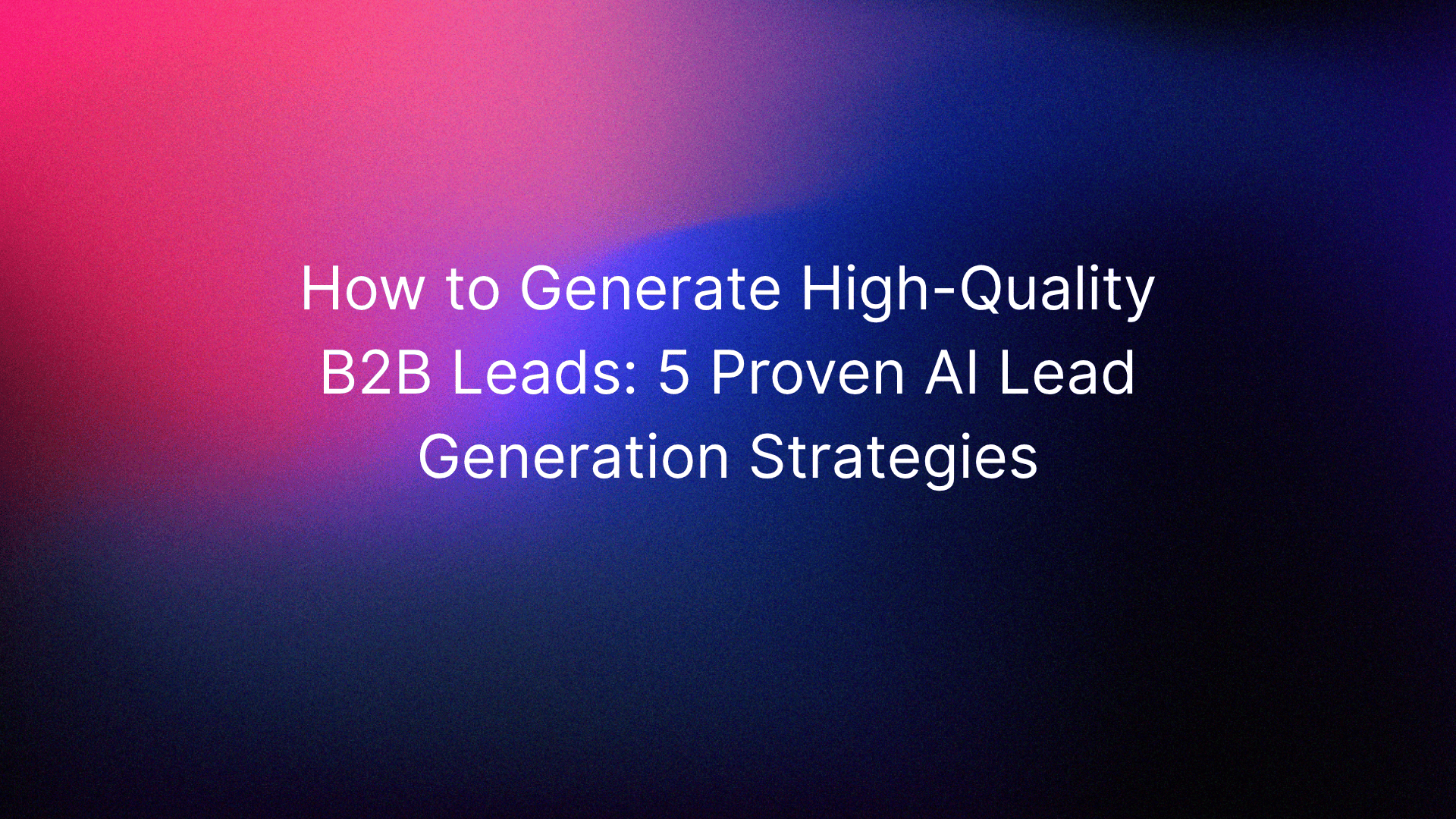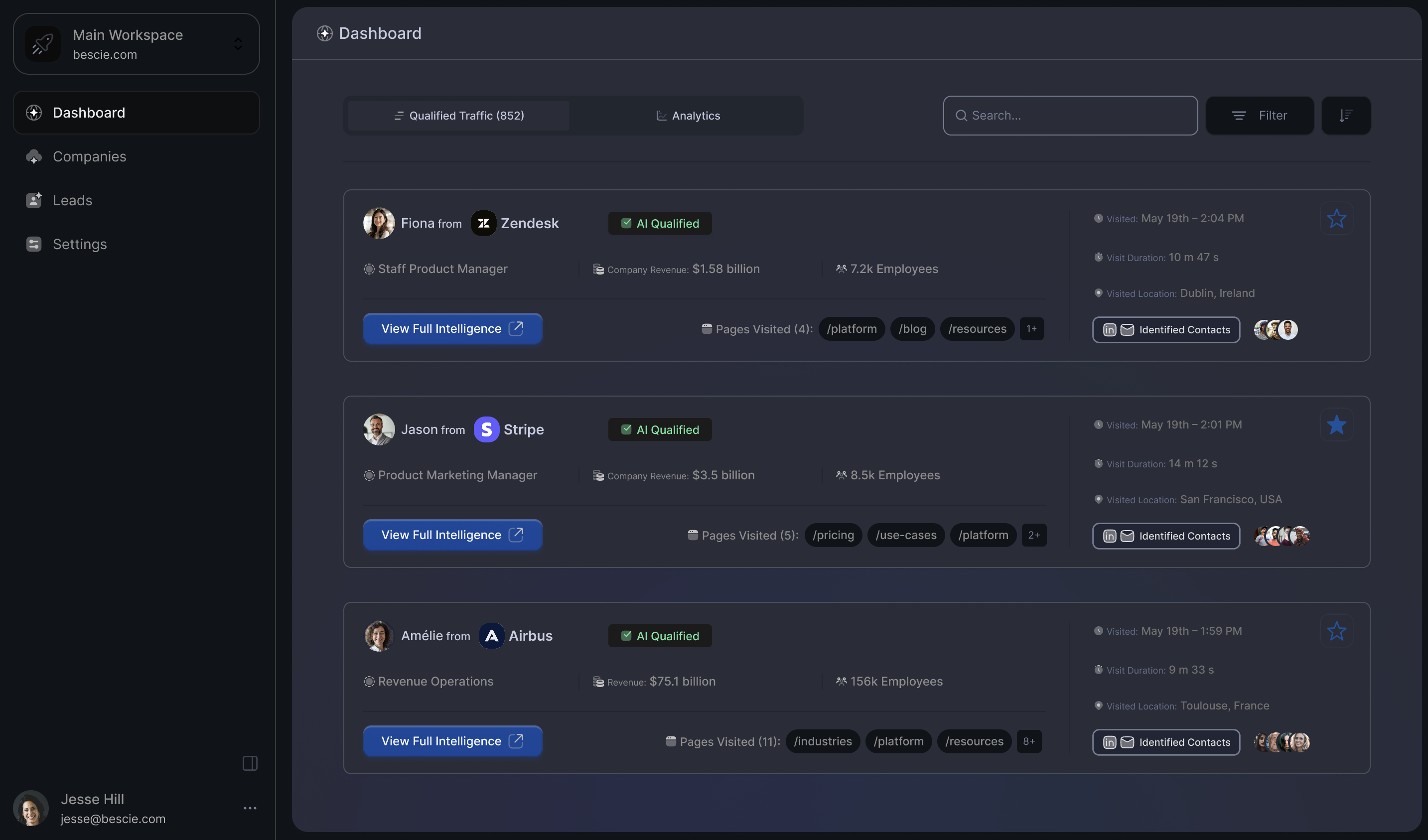
Do you ever feel unsure about where to go next with lead generation? Spending hours sifting through data. Or weeks on a cold pitching campaign. All to eventually see disappointing conversion rates? You’re not alone.
Thankfully with the advent of AI, which is reshaping how businesses discover and engage potential customers. And no, it’s not just about asking ChatGPT to write your emails. For modern sales teams, marketers, and business owners, integrating AI into lead generation is becoming critical to staying competitive.
The days of inefficient cold outreach are numbered. That’s why more B2B companies are turning to AI-driven solutions to build pipeline faster. In fact, recent data shows nearly 80% of sales leaders have introduced AI tools to their workflows in the past year.
What is AI-powered B2B lead generation?
In short, it’s the process of using AI sales tools in your lead generation process to boost efficiency and conversions.
Picture this: Instead of manually searching LinkedIn or Google for potential leads, you can leverage an AI-powered platform to generate a list of CFOs at financial advisory firms that use QuickBooks, complete with mobile-verified contact details. Not only does AI speed up prospecting, but it also delivers more accurate, relevant leads aligned to your ideal customer profile
Here’s how AI can help you in each part of the B2B lead generation process:
And that’s just the outbound side of things. Marketing teams are also using AI to create content, automate chatbots, conduct research, and improve inbound lead generation efforts. Put simply, AI is now enhancing every aspect of how businesses attract, qualify, and convert high-quality B2B leads.
Why use AI to generate B2B leads
Firstly, AI acts as a massive productivity booster by handling repetitive tasks like finding qualified leads, sourcing accurate contact details, or drafting initial follow-up emails. These tasks eat up hours every week . 67% of surveyed sales leaders said their reps spend 11 or more hours per week on research and follow-up.
With AI-driven lead generation platforms, you can automate these manual tasks, freeing up hours that your team can spend building meaningful connections. Imagine what your reps could accomplish with six extra hours a week to engage with leads on a more personal level, like commenting thoughtfully on a prospect’s recent post or crafting highly relevant messages.
Secondly, AI provides you and your team with intel that helps you make better decisions. By processing vast amounts of customer, market, and conversation data in seconds, AI surfaces trends and predictions that would otherwise fly under the radar.
For example, conversational AI tools can analyze sales calls and highlight patterns such as discovering that calls where reps speak more than 60% of the time have a much higher success rate compared to those where they don’t.These insights help your team continuously refine their outreach and sales approach based on real data and not guesswork.
Thirdly, AI allows you to reach more leads with personalised outreach.
It does this in a few ways:
In short, AI helps sales and marketing teams work smarter by automating repetitive tasks, surfacing key insights, and making personalized outreach easier at scale. This opens up opportunities to generate more high-quality leads with fewer resources.
Strategies to generate B2B leads using AI
Ready to make AI part of your lead generation playbook? Here are three effective ways to do it:
1. Automate lead scoring and qualification
Manually sifting through prospects is one of the biggest time drains in B2B lead generation. But AI makes it easier to identify your best-fit leads fast.
Machine learning models analyze lead behavior, demographic data, and engagement patterns to score and qualify prospects automatically. That means your marketing team can nurture early-stage leads, while sales focuses on high-intent prospects ready to buy.
Example: tools like Watchman AI use visitor data and your ideal customer profile to automatically identify high-value leads, score them in real time, and show your team exactly where to focus their efforts
2. Create personalized content
Relevance is key to successful lead generation and AI helps you deliver the right message to the right audience.
AI content tools can generate personalized email copy, LinkedIn messages, or blog content tailored to specific industries, job roles, or pain points. By tapping into AI-driven content creation, your outreach becomes more engaging without adding hours of manual work.
Example: AI tools can draft variations of your outreach emails based on a lead’s company size, industry, or recent online activity, increasing response rates and improving lead quality.
3. Automate lead outreach and follow-up
Persistence matters but following up manually with every lead is time-consuming and inefficient. AI helps automate outreach sequences while keeping them personalized.
Tools equipped with AI can schedule follow-up emails, recommend the best send times, and even personalize messaging based on a prospect’s behavior or engagement history.
The benefit? You stay top-of-mind with leads, improve response rates, and reduce time wasted on manual follow-up tasks.
Limitations and challenges of AI-powered lead generation
Like any emerging technology, AI in lead generation isn’t without its challenges. To get the best results, businesses need to be aware of the common roadblocks and how to address them. Here are three key challenges and practical solutions:
1.Data quality and availability
AI lead generation tools rely heavily on having clean, complete, and up-to-date data. If your contact or account information is outdated or missing critical details, your AI won’t deliver accurate results.
For instance, an AI system can’t generate personalized outreach if you lack key information like a lead’s job role, company size, or industry. The quality of your inputs directly affects the quality of your outputs.
The Solution: Tools like Clay or Common Room are great for filling in and updating your B2B contacts and company records with fresh, compliant data.
2.Lack of in-house expertise
Not every B2B team has the technical background needed to fully leverage AI tools, especially when setting up complex automations or workflows. Without proper training, AI adoption can feel overwhelming or underutilized.
Hiring specialists or investing in training programs can help, but these options require time and budget.
The Solution: If you’re new to AI, start with platforms designed for ease of use. Look for intuitive tools that allow you to input lead criteria and receive targeted lists or insights without a steep learning curve. The right AI tool should enhance your lead generation process and not complicate it.
3.Privacy and compliance concerns
Using AI tools to find B2B contact data opens up the risk of non-compliance with data privacy regulations, like the GDPR. Failure to meet standards can result in costly fines.
The Solution: Make sure your sales intelligence software is compliant with relevant regulations. Ensure the tools you use follow global privacy standards, verify the legitimacy of their data sources, and provide transparent opt-out mechanisms.
